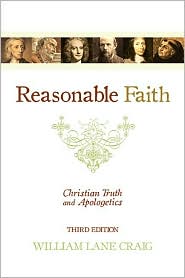Day 3 of 1000
 I talked about a book titled Reasonable Faith that I downloaded to my Nook Color while I walked on a treadmill at the YMCA. It is a great book, but not one that is easy to digest as a light read. I have often listened to William Lane Craig debates and podcasts as I do my nightly walks (well, four times per week anyway). I think different apologetic arguments appeal to differently to different people. What I mean by that is, even though I am totally entranced by discussions of the historicity of Christ, the historical reality of the resurrection of Christ, cosmic fine tuning, and intelligent design, others are more interested in more philosophical questions such as the problem of evil (theodicy) and other philosophical arguments for the existence of God. Reasonable Faith covers all of these.
I talked about a book titled Reasonable Faith that I downloaded to my Nook Color while I walked on a treadmill at the YMCA. It is a great book, but not one that is easy to digest as a light read. I have often listened to William Lane Craig debates and podcasts as I do my nightly walks (well, four times per week anyway). I think different apologetic arguments appeal to differently to different people. What I mean by that is, even though I am totally entranced by discussions of the historicity of Christ, the historical reality of the resurrection of Christ, cosmic fine tuning, and intelligent design, others are more interested in more philosophical questions such as the problem of evil (theodicy) and other philosophical arguments for the existence of God. Reasonable Faith covers all of these.
I started reading about these kinds of topics over twenty five years ago when I had a close relative start beating me up about what I believe. He had been a serious Christian, but had doubts, and, for a period of time, tried to convince others of the rightness of his apostate worldview. I was shaken to my core and wanted to figure out what I really believed. This relative was very taken with the writings of Marcus Borg, a knee-jerk liberal (in the scholarly sense) professor of religion at Oregon State University who is a member of the fringe group called the Jesus Seminar and does not believe Jesus was bodily resurrected, but still claims he is a Christian. After a few fits and false starts I found many, much more reputable scholars such as Gary Habermas, Ben Witherington III, N.T. Wright, and J.P. Moreland, and William Lane Craig. It was quite gratifying to see both N.T. Wright and William Lane Craig destroy Borg in scholarly debates several years after I had started reading this kind of scholarship. You can watch the Craig’s debate with Borg on YouTube. The first in the series of videos can be found here. Borg did not do any better in his debate against N.T. Wright. It is very sad to me as a second generation alumni of Oregon State that this charlatan has been given an endowed chair and continues to promulgate his fringe views at a public university.
At any rate, I have started reading Reasonable Faith. The first section is a very accessible treatise on some philosophical considerations. It talks about Augustine, Aquinas, John Locke, Bultmann, Barth, etc. I think I will get the most out of those sections of the book where I, because of my disposition, have less interest. I am glad for that. I need to be more well-rounded in my understanding of these importand topics.

Leave a Reply